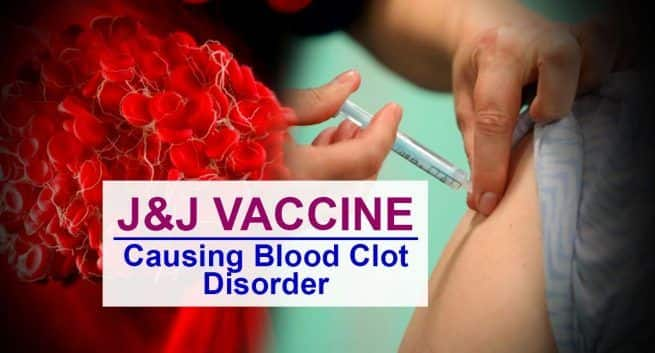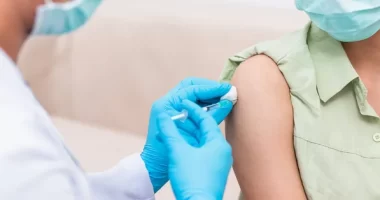
Days after some countries raised concerns over an increasing number of blood clotting disorder incidents being reported among the recipients of Oxford-AstraZeneca’s COVID-19 vaccines, the US Centers for Disease Control (CDC) and Prevention on Thursday, have confirmed 28 cases, including six in men, of an unusual blood clotting disorder in adults who have received the Johnson & Johnson Covid-19 vaccine.
Rare Blood Clotting Disorder – What You Need To Know
According to the CDC, the patients reportedly developed a rare blood clotting disorder post getting vaccinated with the J&J COVID vaccine. This unusual blood clotting is also known as Thrombosis with thrombocytopenia syndrome (TTS). The CDC also stated that to qualify for the diagnosis of this rare blood clot disorder, one must have a blood clot, known as thrombosis in locations such as the brain, as well as low levels of platelets — blood components that promote clotting. Put simply, this type of blood clot is usually found in the veins of the brain.
How does this blood clotting happen inside our brain? To understand this concept one needs to know that the blood in our body normally travels through veins from the brain back to the heart. When there is an obstruction or thrombosis can block the flow of your blood in the brain, leading to the formation of blood clots inside the veins of your brain and this pauses the oxygen supply — leading to abnormalities in your brain’s functions.
This Is Clinically Serious And Potentially Life-Threatening Condition
The number of cases has increased from 15 last month, all of which were in women. Although the latest report has identified a handful of cases in men, women — especially those between the ages of 30 and 49 — remain at high risk.
“The trend is that the reporting rates are higher in females compared to males in all age categories,” Tom Shimabukuro, the deputy director of the immunization safety office at CDC, was quoted as saying. Shimabukuro presented the new cases on Wednesday at a meeting of a panel of advisers to the CDC, the report said. The disorder is a “rare, clinically serious and potentially life-threatening condition,” Shimabukuro said.
28 Cases of Blood Clotting Disorder Linked To J&J Jab
Among the 28 confirmed cases, 12 people who developed the disorder had obesity, 7 had high blood pressure, 3 had diabetes, and 3 were taking estrogen, though it is not yet clear whether any of those factors might substantially increase the risk of the disorder, the report said.
The CDC and the US Food and Drug Administration had, last month, recommended halting the use of Johnson & Johnson’s Covid-19 vaccine, after rare blood clot cases emerged in six recipients.
However, the pause was lifted 10 days after a thorough safety review. The agencies had also issued a warning about the potential risks to the vaccine’s label, which notes that a connection between the vaccine and the condition is “plausible.”
Twenty-two of the confirmed cases so far have been in women, and six have been in men. All were adults between the ages of 18 and 59 who received the vaccine before the national pause. (There was also one additional case recorded in a 25-year-old man who participated in the clinical trial), the NYT said.
Three people have died and four remain hospitalized, including one who is in intensive care. No new deaths have been documented since last month’s meeting, Shimabukuro said.
Can Other Vaccines Too Cause This Disorder?
There have been no confirmed cases of the clotting disorder following the Pfizer-BioNTech or Moderna vaccines, which employ different technology. The roll-out of the single-dose Johnson & Johnson vaccine has been paused in Germany, Denmark, Italy, and Canada over the blood clot concerns.
Symptoms You Are Suffering From Blood Clot Disorder
Here are some of the symptoms that can tell you that you have blood clot disorder and that you need to consult a doctor immediately.
- An acute and persistent headache
- Loss of vision
- Difficulty in breathing
- Unexplained chest pain
- Swelling in your legs
- Abdominal or stomach pain
Neurological symptoms such as weakness in the legs or seizures
How Long Does It Take For Blood Clot Disorder To Appear Post Vaccination?
In an answer to these questions, experts have stated that the symptoms of blood clotting disorder can take between four days and a few weeks to appear. Doctors from around the globe have asked every vaccine recipient to keep a close check on the symptoms for at least a month post-vaccination.
This post first appeared on The Health Site









